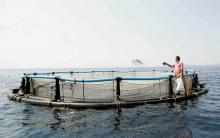Fish farming
Fishermen a vanishing breed, thanks to aquaculture
Giorgos Alevras, 38, plies the coast near the town of Astakos, in west-central Greece, in search of fish. Alevras, who returned to Greece last year after 10 years working abroad in biotechnology, has invested 250,000 euros in a fishing trawler, but the returns have been meager; so far, he says, he has recouped less than 5% of his investment.
- Read more about Fishermen a vanishing breed, thanks to aquaculture
- Log in to post comments
Greek fish farming and its smuggling mafia
Zombie companies, unlicensed units, widespread smuggling and debts of millions of euros make up the dark side of Greek fish farming, not to mention the extensive theft of fish from aquaculture installations.
It is estimated that between 7,000 and 10,000 tons of fish are traded illegally, as they are not recorded in accounting statements.
- Read more about Greek fish farming and its smuggling mafia
- Log in to post comments
Greek islanders dismayed by plan to scale up fish farming
On the sunny quay of the picturesque Greek island of Poros, veteran fisherman Spiros Papaioannou makes no bones about imminent plans to expand fish farming.
"We don't want them on our island," the rubber-booted man in his seventies grumbled while cleaning his nets.
"We fishermen are going to be chased away, that's for sure," he said.
Fishy situation in local aquaculture industry
Unpaid suppliers, fish cargoes that go to waste or are unsuitable when they reach their destination and are forced to be sold at lower prices, successive management changes and funds whose fate is unknown are just some of the elements that paint the picture today at Avramar.
- Read more about Fishy situation in local aquaculture industry
- Log in to post comments
Fish farming industry is seen sinking
Greek aquaculture has been dealt a devastating blow, as after the losses incurred due to the dramatic drop in exports to Italy, exports to France and Spain are also on the slide. Meanwhile, the flight ban between the European Union and the US makes the cost of shipping Greek fish to the American market pretty much prohibitive.
- Read more about Fish farming industry is seen sinking
- Log in to post comments
Bill Gates invests in Greek fish
Fish farming may have nothing in common with the digital world, but it is technology-intensive. That may be one of the factors that has led to the involvement of Microsoft owner Bill Gates in aquaculture, including the sector in Greece.
- Read more about Bill Gates invests in Greek fish
- Log in to post comments
Greek fish see market share abroad decline
Greek fish farming products, mainly sea bream and bass, suffered fresh losses in their market share in the principal countries they are exported to last year due to the major competition they now face, primarily from their Turkish rivals.
- Read more about Greek fish see market share abroad decline
- Log in to post comments
Selonda gets ‘Fish from Greece’ certification
Selonda Aquaculture has received the "Fish from Greece" private certification from the TUV Hellas monitoring organization, concerning responsible fish farming and underscoring the high quality of Greek fish.
After acquiring the certification, the fish distributed by the Greek firm will also bear the "Fish from Greece" tag.
- Read more about Selonda gets ‘Fish from Greece’ certification
- Log in to post comments
Drop in fish farming output will see prices rebound
Prices of sea bass and sea bream have dropped to their lowest level in recent years, aggravating the already difficult situation of the two main aquaculture companies in Greece, Nireus and Selonda, but the United Nations Food and Agriculture Organization (FAO) estimates that 2020 may signal the start of a price recovery for the two important fish farming products.
Greek fish farming suffering from fierce competition after lira drop
The impact of the collapse in the Turkish lira last year had a predictable impact on Greek fish farming sales.
Although Greek aquaculture companies managed to sell greater quantities in 2018, according to the financial figures they released, the average sale prices dived due to pressures in foreign markets from the much cheaper Turkish fish.










